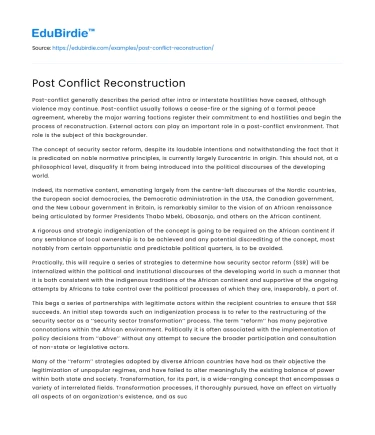Post-conflict generally describes the period after intra or interstate hostilities have ceased, although violence may continue. Post-conflict usually follows a cease-fire or the signing of a formal peace agreement, whereby the major warring factions register their commitment to end hostilities and begin the process of reconstruction. External actors can play an important role in a post-conflict environment. That role is the subject of this backgrounder.
The concept of security sector reform, despite its laudable intentions and notwithstanding the fact that it is predicated on noble normative principles, is currently largely Eurocentric in origin. This should not, at a philosophical level, disqualify it from being introduced into the political discourses of the developing world.
Save your time!
We can take care of your essay
- Proper editing and formatting
- Free revision, title page, and bibliography
- Flexible prices and money-back guarantee
Indeed, its normative content, emanating largely from the centre-left discourses of the Nordic countries, the European social democracies, the Democratic administration in the USA, the Canadian government, and the New Labour government in Britain, is remarkably similar to the vision of an African renaissance being articulated by former Presidents Thabo Mbeki, Obasanjo, and others on the African continent.
A rigorous and strategic indigenization of the concept is going to be required on the African continent if any semblance of local ownership is to be achieved and any potential discrediting of the concept, most notably from certain opportunistic and predictable political quarters, is to be avoided.
Practically, this will require a series of strategies to determine how security sector reform (SSR) will be internalized within the political and institutional discourses of the developing world in such a manner that it is both consistent with the indigenous traditions of the African continent and supportive of the ongoing attempts by Africans to take control over the political processes of which they are, inseparably, a part of.
This begs a series of partnerships with legitimate actors within the recipient countries to ensure that SSR succeeds. An initial step towards such an indigenization process is to refer to the restructuring of the security sector as a ‘‘security sector transformation’’ process. The term ‘‘reform’’ has many pejorative connotations within the African environment. Politically it is often associated with the implementation of policy decisions from ‘‘above’’ without any attempt to secure the broader participation and consultation of non-state or legislative actors.
Many of the ‘‘reform’’ strategies adopted by diverse African countries have had as their objective the legitimization of unpopular regimes, and have failed to alter meaningfully the existing balance of power within both state and society. Transformation, for its part, is a wide-ranging concept that encompasses a variety of interrelated fields. Transformation processes, if thoroughly pursued, have an effect on virtually all aspects of an organization’s existence, and as such require astute management if the success of such processes is to be ensured .






 Stuck on your essay?
Stuck on your essay?

